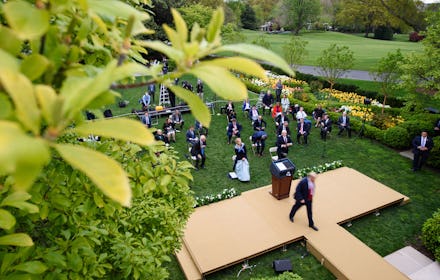Trump says he's cutting WHO funding, blaming it for "so much death"

On Tuesday evening, President Trump moved his daily coronavirus briefing from the West Wing press room to the White House Rose Garden — a setting that lent an incongruous air of significance to what turned out to be one of the president's more excitable performances to date. Ostensibly, the briefing covered two major announcements from the administration:
- a hold on funding for the World Health Organization because, as Trump put it, the WHO was responsible for "so much death" due to "their mistakes" in handling the coronavirus pandemic.
- the creation of a massive committee comprised of corporate big shots to help advise the president on the economy.
In actuality, both developments were part of the Trump administration's longstanding effort to shift blame, and responsibility, for its catastrophic handling of the coronavirus pandemic thus far.
Trump's decision to stop funding for the WHO comes as the president and his proxies have increasingly sought to shift blame away from their own anemic response to the pandemic and onto the WHO, which according to Trump "willingly took China’s assurances to face value” and “pushed China’s misinformation."
"This is COVID-19, not COVID-1, folks," White House counselor Kellyanne Conway said on Fox News on Wednesday morning, in an attempt to insinuate that the WHO had been twiddling its collective thumbs during 18 previous iterations of the virus. "You would think the people in charge of the World Health Organization, facts and figures, would be on top of that."
In fact, the "19" in COVID-19 simply denotes the fact that the virus was first detected in 2019.
While there is some evidence to suggest that China's delayed response during the early days of the coronavirus outbreak may have cost the world valuable response time, Trump's allegation that the WHO — which has been warning for months that the "window of opportunity" to stop the virus was "closing" — was somehow played by China is rather farcical. In fact, the WHO's so-called sin of taking China at "face value" could also describe Trump's own public praise of Beijing during the pandemic's early stages.
Now that the administration's own bungling response to COVID-19 is being laid bare, however, the president has ramped up his scapegoating efforts, all the while insisting "I don't take responsibility at all" for his administration's lagging action. And if that scapegoating includes a healthy dash of nativist xenophobia and anti-"globalist" scaremongering, well, all the better to play to his base.
But there's a second base the president played to during his Tuesday evening briefing, too: the big-money one. Trump spent nearly 10 minutes of his briefing rattling off a list of corporate who's-whos, people he had drafted to his "Great American Economic Revival Industry Group" — a sort of big business task force designed to help pull the American economy out of the toilet it's been floating in for the past few months.
"Now, we have a list of people that I’ll be speaking to over the next very short period of time, in many cases, tomorrow,” Trump told reporters in the Rose Garden. “We have a list of different industries that I’ll be discussing by meeting by telephone, because we don't want people traveling right now."
The full list of names — nearly 200 in all — features corporate representatives from just about any big industry you can think of: farming, banking, weapons manufacturers, casinos, fast food, baseball. Included also are a number of high-profile Trump allies and donors, including New England Patriots owner Bob Kraft and WWE CEO Vince McMahon — whose business of people clobbering each other with folding chairs was just deemed "essential" by Florida Gov. Ron DeSantis (R). The same day, McMahon's wife Linda, a former Trump Cabinet official, announced that her pro-Trump super PAC would be dropping millions of dollars' worth of re-election ads for the president in, yup, Florida.
The president did not expand on just how this massive committee of big-money big shots would actually go about advising him on the pandemic-ravaged economy. As Politico put it, Trump merely "assembled a list of almost 200 people to participate in conference calls." But given his stated preference for opening the country back up on May 1 — a premature date by many experts' views — the newly minted advisers have certainly got their questionably meaningful work cut out for them.
In the meantime though, Tuesday's briefing summed up a trend of Trump's coronavirus response: He cast about for anyone else to blame for the problem but him, then turned around and found 200 people other than him who could be tasked with solving it.